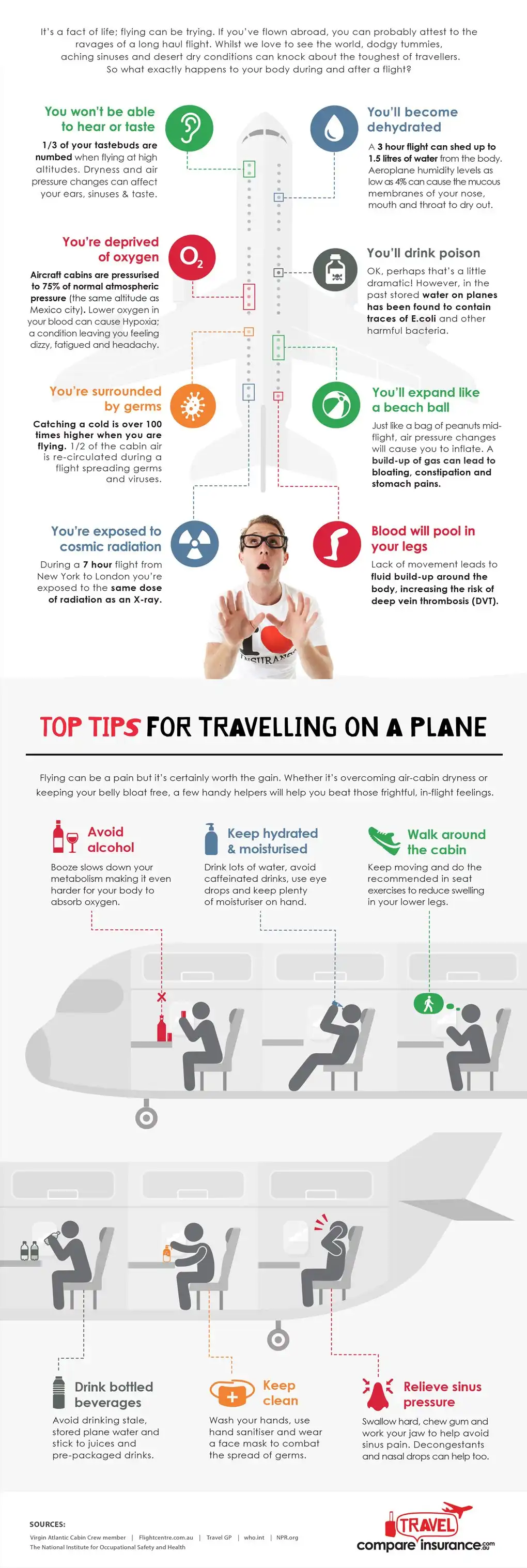
So what exactly happens to your body after boarding a flight?
-
You won’t be able to hear or taste: A 1/3 of your tastebuds are numbed when flying at high altitudes. Dryness and air pressure changes can affect your ears, sinuses & taste.
-
You’ll become dehydrated: A 3 hour flight can shed up to 1.5 litres of water from the body. Aeroplane cabin humidity levels as low as 4% can cause the mucous membranes of your nose, mouth and throat to dry out.
-
You’re deprived of oxygen: Aircraft cabins are pressurised to 75% of normal atmospheric pressure (the same altitude as Mexico city). Lower oxygen in your blood can cause Hypoxia; a condition leaving you feeling dizzy, fatigued and headachy.
-
You’re sat in a tube of germs: Catching a cold is over 100 times higher when you are flying. ½ of the cabin air is re-circulated during a flight spreading germs and viruses.
-
You’ll drink poison: OK, perhaps that’s a little dramatic! However, in the past stored water on planes has been found to contain traces of E.coli and other harmful bacteria.
-
You’ll expand like a beach ball: Just like a bag of peanuts mid-flight, air pressure changes will cause you to inflate. A build-up of gas can lead to bloating, constipation and stomach pains.
-
Blood will pool in your legs: Lack of movement leads to fluid build-up around the body, increasing the risk of deep vein thrombosis (DVT).
-
You’re exposed to cosmic radiation: During a 7 hour flight from New York to London you’re exposed to the same dose of radiation as an X-ray.
Top tips for flying on a plane
Flying can be a pain, but it's certainly worth the gain. Whether it's overcoming air-cabin dryness or keeping your belly bloat free a few handy helpfuls will beat those frightful in-flight feelings.
-
Avoid Alcohol Booze slows down your metabolism making it even harder for your body to absorb oxygen.
-
Keep hydrated & moisturised Drink lots of water, avoid caffeinated drinks, use eyes drops and keep plenty of moisturiser on hand.
-
Walk around the cabin Keep moving and do the recommended in seat exercises to reduce swelling in your lower legs.
-
Drink bottled beverages Avoid drinking stale, stored plane water and stick to juices and pre-packed drinks.
-
Keep clean Wash your hands, use hand sanitiser and wear a face mask to combat the spread of germs.
-
Relieve sinus pressure Swallow hard, gently pop your ears and work your jaw to help avoid sinus pain.

Natalie Smith
Having travelled to over 40 countries, studied tourism management and worked as a flight attendant for over three years, Natalie knows more than a thing or two about travel! She’s an adventure-lover, whose favourite trips have been trekking Machu Picchu and volunteering in an animal shelter in the Amazon. Qualified in Tier 2 General Insurance General Advice and specialising in travel insurance for the last five years, she in passionate about helping travellers get the most out of their holiday.








